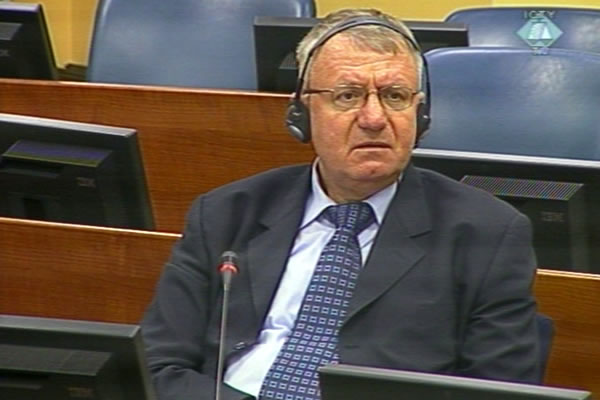Home
SESELJ: ‘SOME SERBS HAD NO MILITARY HONOR, BUT NOT SESELJ’S MEN’
The Serbian Radical Party leader denied responsibility for the crimes alleged in the indictment. Seselj shifted the blame for the murder of Muslims in Zvornik on ‘Arkan’s men’. The accused also blamed the killing of Croats at Ovcara on the JNA intelligence chief Aleksandar Vasiljevic, the Croatian secret service and the director of the Vukovar Hospital Vesna Bosanac
 Vojislav Seselj in the courtroom
Vojislav Seselj in the courtroom In the introductory part of his closing argument today, Vojislav Seselj presented a detailed overview of his theory of how foreign intelligence services controlled the Tribunal in The Hague. Their goal at first was to impose a defense lawyer to defend him and thus contribute to his eventual conviction. When they failed, they changed their tactic and ‘decided to kill me’, Seselj said. He is sure that his recent problems with cardiologic implants did not have a natural cause. Although he admits he doesn’t know ‘how they are doing it’, Seselj is convinced that they are trying to harm him using electronic devices.
Referring to the arguments presented by the prosecution in its closing argument, Seselj admitted that in his pre-war speeches he said that ‘there will be rivers of blood’ if Croatia and BH declared their independence. However, Seselj didn’t see this as a threat, but as a warning. As he explained, it’s not fair to blame the person who warned of possible bloodshed; the responsibility rested with those who declared independence knowing full well what would follow. Seselj also admitted that in the wars in the former Yugoslavia ‘there were Serbs who lost their sense of military honor’, but denied that the volunteers run by his party were among them. Seselj also noted that ‘the first crimes were committed against Serbs’.
Seselj began contesting his responsibility for the crimes alleged in the indictment by presenting his take of the events in Zvornik. Seselj repeated his previous claims that ‘Seselj’s men’ under the JNA command participated in the attack on the town but insisted that the SRS volunteers returned to Serbia after the attack. As he said, new units were set up at that time. Some of them may have been under the command of erstwhile SRS volunteers. If that was the case, these men struck out on their own and Seselj couldn’t be blamed for their crimes. Seselj shifted the blame for the murder of Muslims immediately after the town was overrun on ‘Arkan’s men’. Seselj claims his volunteers cared for Muslim civilians and ‘gave them chocolate and biscuits’ from abandoned shops. Seselj claimed he was not guilty of those crimes, although they were committed as part of a joint criminal enterprise which included both Seselj and Zeljko Raznatovic Arkan.
Seselj then moved on to the crimes in Vukovar. The gravest crime committed there is the murder of prisoners taken from the town hospital to the Ovcara farm in November 1991. Seselj’s version of the events would make a convoluted crime novel. According to Seselj, the persons who have been indicted or convicted before the Tribunal were not guilty; the actual masterminds were still at large. Seselj has already claimed that the crime at Ovcara was masterminded by the then chief of the JNA military security Aleksandar Vasiljevic. Today Seselj explained that it was done in collusion with the Croatian intelligence service. The goal was to accuse the Serb people of it and make it easier for Croatia to declare its independence. As Seselj indicated in his closing argument, the Canadians were behind Vasiljevic; they rewarded him by ‘agreeing’ to let Vasiljevic’s two daughters live and work in Canada.
Elaborating his Vukovar theory, the Radicals’ leader said that an agreement was reached at the meeting between Vesna Bosanac, the director of the Vukovar Hospital, and the JNA military intelligence officers to kill exactly 200 prisoners at Ovcara. As 207 prisons were originally taken there, seven of them were released. Seselj said he came to understand why the remains of the seven of the 200 victims have never been identified: these were Kurdish mercenaries.
Seselj didn’t deny that he supported the unification of all Serb countries into a Greater Serbia but denied that he had ever advocated any ethnically homogenous entities. As Seselj said, a Greater Serbia’s diversity would include Orthodox Serbs, Catholic Serbs, Muslims Serbs, Protestants and atheists together with loyal members of ethnic minorities. The accused was offended by the fact that the prosecution had labeled him a ‘quasi-military’ leader in its closing argument. He retaliated by saying today that this claim was made by the ‘quasi-prosecutor’. Seselj insisted that he had done his national service in the army and at the beginning of the war he put himself in the service ‘of the fatherland’; in fact, he still is ready to serve his country.
Seselj will continue his closing argument tomorrow and will complete it next week.
Linked Reports
- Case : Seselj
- 2012-03-12 JUDGES WANT A NEW MEDICAL TEAM FOR SESELJ
- 2012-03-09 SESELJ IN HOSPITAL, CLOSING ARGUMENTS POSTPONED
- 2012-03-07 PROSECUTOR: 28 YEARS IN PRISON ADEQUATE FOR SESELJ’S CRIMES
- 2012-03-15 SESELJ WILL NOT RENOUNCE CHETNIK VOJVODAS, BUT DENIES ANY LINKS WITH THEM
- 2012-03-20 ‘GLORY AWAITS’ SESELJ AS HE RECITES LA MARSEILLAISE AND WANTS TO BE SENTENCED TO LIFE IN PRISON
- 2012-05-21 DETENTION ‘COMPATIBLE’ WITH SESELJ’S HEALTH
